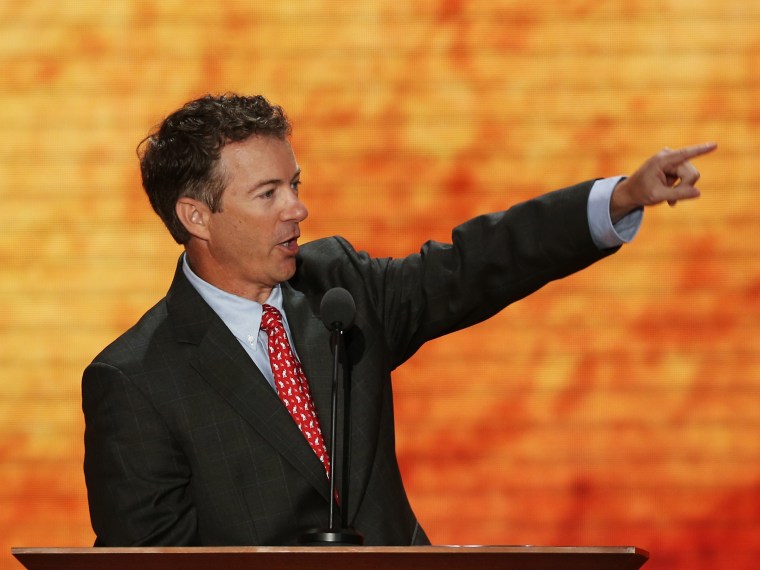Let me finish tonight by giving Rand Paul some credit.
We talked tonight on Hardball about all of those critical comments he made in the not-so-distant past about a man that today's Republican Party practically regards as a saint: Ronald Reagan.
It's an inconvenient revelation for Paul, who is clearly interested in winning the Republican presidential nomination in 2016--which is why his office was quick to put out a statement lavishing praise on Reagan and trying to shift the blame the explosion in deficit spending that came during his presidency onto the Democratic Congress of the 1980s. Arguing against the image of Reagan as an infallible beacon of conservative principles that now prevails on the right is obviously not something the Rand Paul is interested in doing anymore.
But the fact that he was making that argument just a few years ago is a very helpful reminder of just how thoroughly, quickly, and misleadingly history can be revised and rewritten because the view of Ronald Reagan that Rand Paul expressed a few years ago was the view that a lot of conservatives expressed when Ronald Reagan was president.
As Paul pointed out, the national debt absolutely did explode on Reagan's watch. It started with his first budget, which slashed tax rates and raised defense spending without significant cuts elsewhere. To hear conservatives tell it today, that budget triggered a massive economic resurgence and unleashed nearly a decade of prosperity.
In reality, though, unemployment actually spiked to over 10% in Reagan's second year in office. His approval rating plummeted. His party was drubbed in the 1982 midterms, and the cries of betrayal from the right were loud.
"It's just not a very conservative administration," Richard Viguerie, one of the most prominent conservatives of the Reagan era, said back then. "It seems like every day they hit us with something that makes us mad."
And it wasn't just the deficit that made conservatives mad at Reagan. It was a whole host of issues--from school prayer and abortion to diplomacy with the Soviet Union where they believed Reagan wasn't living up to the promises he'd made them.
At his lowest point, in early 1983, there was an effort to recruit a conservative primary challenger to run against him in 1984. "What infuriates conservative leaders," Newsweek wrote at the time, "is how far they are from achieving their agenda even though a man they thought of as one of their own sits in the White House."
Of course, a full-scale mutiny never actually occurred. The economy did bounce back by 1984 and Reagan rode a wave of personal goodwill to a landslide re-election victory. But even as the 1980s wound down and he prepared to leave office, there was a strong sense on the right that Reagan's presidency had been a missed opportunity. For the nearly 200 years that America existed before he became president, the country had racked up a total debt of about $1 trillion. After Reagan's eight years in office, that number had more than doubled. And the federal government he left behind was actually bigger than the one he'd inherited from Jimmy Carter.
It's why in 1988, a former Republican congressman who'd been one of Reagan's earliest and most ardent supporters bolted the party and decided to run for president as a third party candidate. He explained his decision this way: "I want to totally disassociate myself from the Reagan administration."
That former congressman's name was Ron Paul.
What Ron Paul's son said about Ronald Reagan a few years ago was once a fairly common sentiment on the right. The reality of the Reagan presidency was a lot more complex, a lot less conservative, and a lot more interesting than ambitious Republican politicians are allowed to admit these days.
